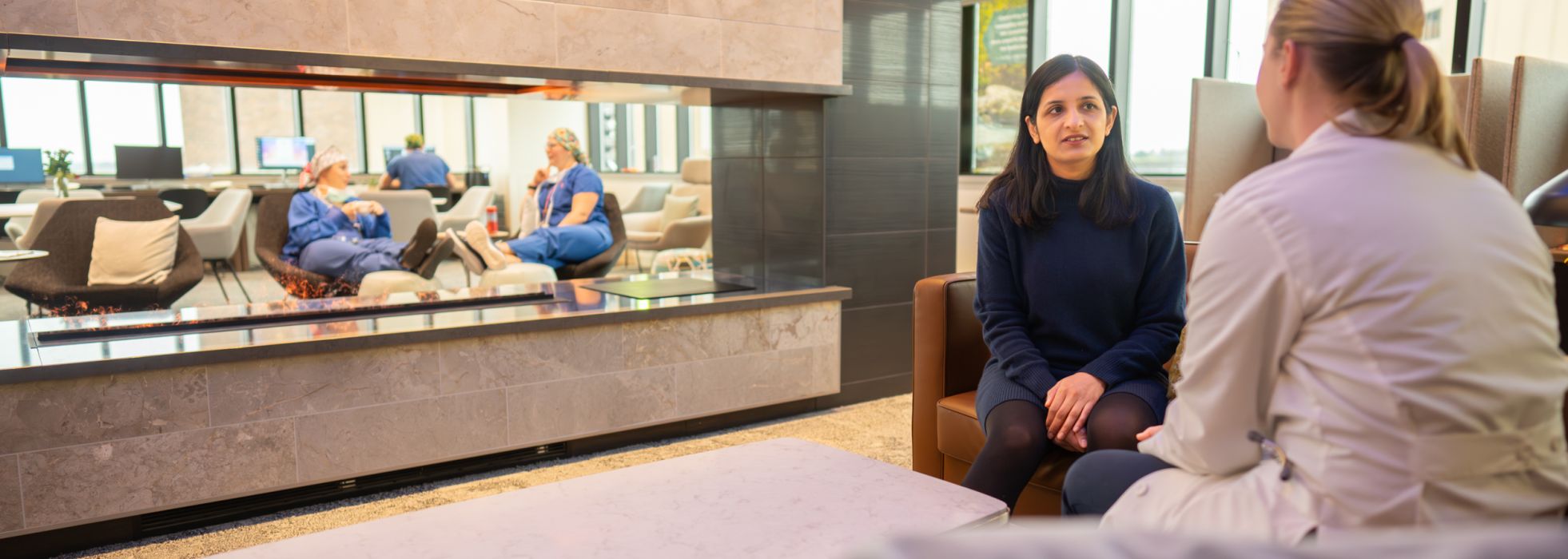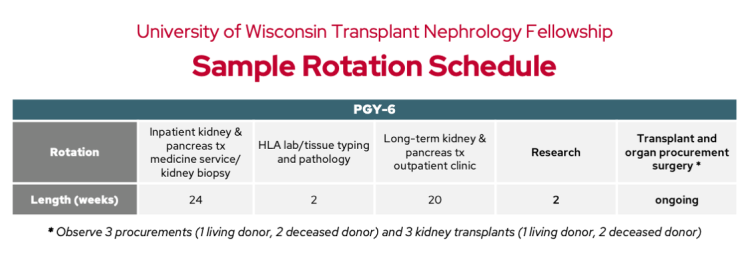About Our Program
The University of Wisconsin transplant nephrology fellowship partners closely with the UW Health Kidney Transplant program, one of the first and most active programs of its kind in the nation.
Here, you'll train with approachable mentors, enjoy a strong working relationship with our colleagues in the Department of Surgery and develop leadership skills in academic medicine.

Meet Our Program Director
"We offer a comprehensive training experience in transplant nephrology here at UW-Madison. Our program is founded in storied tradition, while advancing the field with ongoing innovation. Train with us and you'll be well on your way to your career goals."

Why You'll Love Our Program
- Consistently among the top 10 most active kidney transplant programs in the U.S.
- Our own organ procurement organization (OPO) and human leukocyte antigen (HLA) laboratory
- Comprehensive clinical and procedural training experience
- Exposure to cutting-edge research and clinical approaches to reducing the risk of antibody-mediated rejection through desensitization protocols
- Rich collaborative environment with Transplant Surgery and novel innovations in the field
- Robust interprofessional multidisciplinary team philosophy fostering fellow education and growth
How to Apply
We accept two fellows per year. Applications are accepted on a rolling basis until both positions fill, though to ensure your application is considered you should submit your application by December.
As a part of your application, you will be asked to upload a current CV, personal statement (cover letter), and three references; one of your references must be the Program Director of your general nephrology fellowship program.
For more information, please contact:
Derek Strom, MS
Program Manager
Graduate Success
University of Wisconsin transplant nephrology fellowship graduates have enjoyed successful careers, and many alumni currently hold faculty positions at academic medical centers throughout the United States and internationally.
Administrative Staff
Program Manager
Primary contact for questions, concerns and training verifications.
Leadership
Program Director
Curriculum
We provide fellows with the clinical experience, procedural skills, and professional and ethical behavior needed for the subspecialty of nephrology and kidney transplantation—and to lead a UNOS-approved kidney transplant program.
Didactic and Clinical Experiences
- Core Areas of Training
-
- Recipient evaluation and preparation for kidney and pancreas transplantation
- Evaluation of the potential living kidney donor
- The biologic basis of HLA and transplant rejection
- Methods of tissue typing, cross matching, allo-antibody measurement and clinical application of these methods
- Pharmacology and clinical use of established and emerging immunosuppression for kidney and pancreas transplantation
- Early outpatient care of kidney and pancreas transplant recipients
- Recognition of surgical complications of kidney and pancreas transplantation
- Evaluation and management of acutely ill kidney or pancreas transplant recipients
- Diagnosis and management of infections in transplant recipients
- Long-term medical management of kidney and pancreas transplant recipients
- Diagnosis, pathogenesis and clinical management of renal allograft dysfunction/DGF
- The use of intravenous immunoglobulin, plasmapheresis and other techniques to lower or modify anti-HLA antibody in sensitized patients.
- Ethical considerations in organ transplantation
- Conferences
-
You'll have access to all general nephrology didactics and conferences, plus these didactic sessions:
- Transplantation Core Curriculum Lectures (monthly)
- Transplant M&M (monthly)
- Department of Surgery Transplant Grand Rounds (weekly)
- Living Donor Review (weekly)
- Recipient Review (twice weekly)
- Pancreas Review (twice monthly)
- Research (monthly)
Scholarship and Teaching
Scholarly Activity
The Division of Nephrology provides support to attend transplant meetings throughout the year, plus resources to aid with publishing research. As junior faculty members, you'll also begin to gain leadership experience in academic medicine.
Teaching
Together with general nephrology fellows, you'll share responsibility for supervising and teaching internal residents and medical students on the inpatient transplant medicine and transplant consult service.
You are also expected to present one Grand Rounds presentation, one transplant core curriculum, and one to two Journal Clubs.
Aims and Accreditation
At the end of the training year, the fellow should be able to:
- Delineate potential recipient and donor evaluation algorithm
- Understand the immunological process of acute and chronic rejection
- List short and long-term complication and management of kidney transplant and donor nephrectomy
- Demonstrate understanding of pharmacology of currently available immunosuppressive agents and their complications
- Know the role of Organ Procurement and Transplant Network in regulating allocation of deceased donor organ transplantation.
Accreditation
The program is certified by the American Society of Nephrology (ASN) and the American Society of Transplantation (AST).




